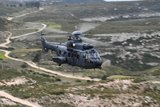UAE air force told 'not to escalate' Qatar air dispute
The air force of the UAE has been ordered ‘not to escalate’ a civil aviation dispute with Qatar, a military official said on 23 January.
In a statement Brig Gen Hilal Sayeed al Qubaisi said: ‘From the beginning of the Qatari provocations, we were given instructions from our superiors not to escalate in this area as part of our commitment to the principle of regional security and peace, and also for the safety of these planes and those on board.’
Qubaisi said the UAE's air force - a key member of a Saudi-led military coalition which has intervened in Yemen's war - had developed ‘new routes’.
Qubaisi added: ‘Our air force can reach the usual destinations using Saudi airspace. This action by Qatar will never affect the movement of our military aircraft.’
The UAE has accused Qatari fighter jets of ‘intercepting’ two Emirati passenger planes en route to Bahrain recently and has since filed a complaint to the United Nations (UN).
It said Qatari fighter jets had flown within 3.2 kms of two flights descending towards Bahrain's international airport, drawing a swift denial from Doha.
The two countries have clashed over alleged airspace violations in recent weeks, as a diplomatic crisis in the Gulf enters its eighth month.
Saudi Arabia, the UAE, Bahrain and Egypt cut all ties with Qatar in June 2017 over Qatar's alleged ties to Islamist extremists and Shiite Iran.
Qatar, which denies the accusations, is banned from using the airspace of the four states under the boycott, although UAE airlines continue to operate flights through Qatari airspace.
Abu Dhabi is now looking at re-routing flights to Bahrain to avoid Qatari airspace.
For its part, Qatar has accused UAE fighter jets of violating its airspace both in December 2017 and January 2018, and it has filed formal complaints with the UN.
More from Defence Notes
-
![Golden Dome for America hits one-year mark but key questions remain on its progress]()
Golden Dome for America hits one-year mark but key questions remain on its progress
Integration issues, bureaucracy and undefined policies and authorities could hamper the full implementation of the “shield” to defend the US territory against aerial threats.
-
![New opportunities for defence firms as EU steps up support for Ukraine]()
New opportunities for defence firms as EU steps up support for Ukraine
The European Commission is looking for startups and other innovators to address challenges across the land, air and sea domains.
-
![Why small guns have been critical to layered CUAS architectures]()
Why small guns have been critical to layered CUAS architectures
Multiple countries have been deploying small arms as the last line of drone defence due to their multiple operational and tactical advantages.
-
![Singapore Airshow 2026: ST Engineering hints at export success for AME assault rifle family]()
Singapore Airshow 2026: ST Engineering hints at export success for AME assault rifle family
The Singapore-based technology company unveiled its new rifle family at this week’s airshow. Chen Chuanren spoke with the ST Engineering’s head of small arms to find out more about how the weapons have been refined.
-
![High tension in the High North – a wake-up call for NATO’s future Arctic defence efforts?]()
High tension in the High North – a wake-up call for NATO’s future Arctic defence efforts?
Any potential ‘Arctic Sentry’ mission would be months in the planning, but with tensions high in the region given the US’s push for Greenland, NATO countries will need to continue to emphasise their commitment to the region, analysts have said.

























